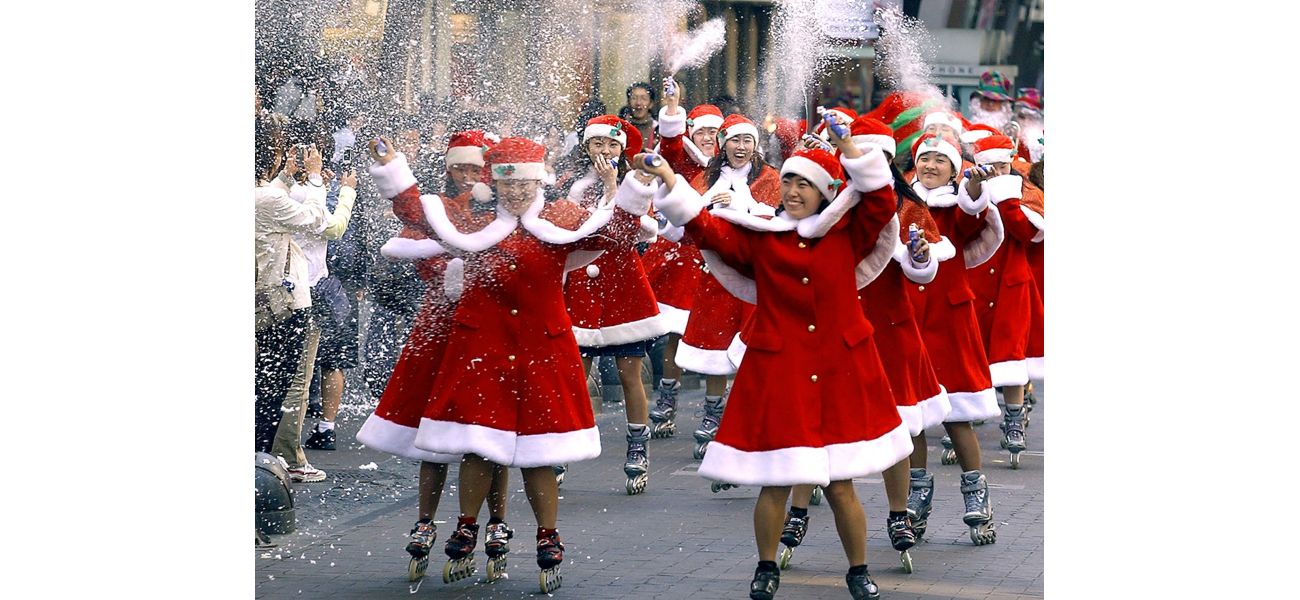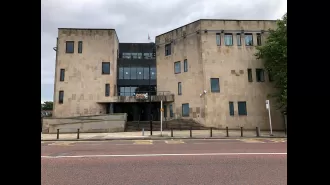A rare holiday custom of roller skating is in danger of vanishing.
Too warm for sledding.
December 17th 2024.

Can you imagine anything more exciting than roller skating with a Christmas theme? Out of all the holidays, Christmas holds a special place in my heart when it comes to having a great time. There's delicious cake, fun party games, and a scrumptious three-course meal, all while we tell jokes and sport silly hats – what's not to love? But hold onto your hats, because there's one thing that can make Christmas even more merry – roller skates.
That's right, just when you thought Christmas couldn't get any better, the wonderful people of Venezuela have taken things up a notch with their unique and delightful Christmas tradition. It's a tradition that puts building snowmen to shame with its weird and wonderful charm. It's called "Las patinatas," which means "the skating," and it dates back to the 1950s. The tradition involves skating all night long and then attending a 5am or 6am Mass from December 16th to 24th. But in recent years, things have changed. Political turmoil and economic struggles have taken a toll on daily life in Venezuela, and now this beloved tradition is at risk of fading away.
You may be wondering, why do Venezuelans skate to Christmas mass? Well, it all boils down to their love for fireworks. And Christmas is no exception – the streets come alive with the sound of firecrackers exploding, adding to the pealing of church bells. So why walk when you can skate to mass? During this time, most roads are closed overnight, and people don festive attire as they make their way to church on their skates. And let's not forget the delicious treats and hot chocolate or coffee that await them. In fact, many children receive roller skates, roller blades, or skateboards as gifts to take part in this tradition.
But how did this tradition of roller skating to mass begin? Legend has it that children go to bed with a piece of string tied around their toe, with the other end dangling out of the window. As skaters pass by, they give the string a tug, and children know that it's time to put on their skates and join in the fun. In some areas, food stalls sell traditional Christmas dishes, although this has decreased in recent years due to safety concerns. Once mass is over, families gather in the streets and at each other's homes to share a meal, play music, and dance. It may not be roasting chestnuts around an open fire, but it has all the elements of a perfect Christmas – family, togetherness, food, and fun.
But how did Venezuela's history shape this unique Christmas tradition? Christmas is all about family in Venezuela. While the exact origins of this tradition are unclear, some suggest that it may have started as an alternative to sledding. After all, the temperatures in the southern hemisphere during December can reach the high thirties, making it difficult to enjoy traditional winter activities. And this tradition also reflects the country's diverse demographic, which may be liberal in name but not always in practice.
Now, you may be wondering, can you travel to Venezuela to experience this festive tradition? Well, as of December 2024, the UK government advises against it due to the country's high murder rate, frequent violent crime, and disruptions in essential services like healthcare. In fact, it's considered one of the most dangerous countries for travelers. The Foreign Office also warns about power outages, food shortages, and limited support for detained foreigners.
Christianity is the largest religion in Venezuela, but the country's unique culture is a blend of Amerindian, Spanish, African, Italian, Portuguese, and German influences. Geographically, Venezuela is also surrounded by Colombia, Brazil, Guyana, and the Caribbean Sea, which adds Caribbean influences to its melting pot of cultures. And it's this diverse blend that gives Venezuela its distinctive identity, especially during Christmas time. Somewhere in this mix lies the roots of the festive tradition of skating to mass.
But sadly, Venezuela's current political climate has had an impact on this cherished tradition. As the country struggles with political turmoil and economic hardships, the tradition of las patinatas is at risk of fading away. Yet, despite these challenges, the spirit of Christmas remains strong in the hearts of Venezuelans, and they continue to celebrate with their loved ones, as they have for generations. And in the end, isn't that what Christmas is all about? Family, love, and making cherished memories.
Can you think of anything more enjoyable than roller skating with a Christmas theme? Personally, I believe Christmas is the most enjoyable holiday. There's so much to love about it - delicious cake, fun party games, and a three-course meal while wearing silly hats and sharing jokes. But there's one thing that could make it even better - roller skates. Yes, you heard that right. Just when you thought Christmas couldn't get any more cheerful, the wonderful people of Venezuela have introduced a unique and exciting Christmas tradition that puts building snowmen to shame.
Known as "las patinatas" or "the skating," this tradition dates back to the 1950s. It involves staying up all night roller skating and then attending a 5am or 6am mass from December 16th to 24th. But in recent years, las patinatas have undergone some changes. The political unrest and economic struggles in Venezuela have taken a toll on the daily lives of its people, and now this beloved tradition is at risk of fading away.
So, why do Venezuelans roller skate to Christmas mass? Well, this country is known for its love of fireworks, and Christmas is no exception. The sound of firecrackers exploding in the streets wakes up the residents, adding to the ringing of church bells. With most roads closed overnight, people put on their best festive attire and enjoy treats like hot chocolate and coffee. Many children receive roller skates, roller blades, and skateboards as gifts to take part in this tradition.
But how did this tradition start? Legend has it that children go to bed with a string tied around their toes, and the other end dangling out of the window. As the skaters pass by, they give the string a tug, signaling to the children that it's time to put on their skates. In some areas, food stalls sell traditional Christmas dishes, but this has decreased in recent years due to safety concerns.
After mass, families gather in the streets and their homes to share food, music, and dance. It's not quite the same as roasting chestnuts over an open fire, but it has all the elements of a traditional Christmas - family, togetherness, food, and fun. This tradition has become so popular that the government closes the streets until 8am, allowing families to skate together safely.
But how did Venezuela's history shape this unique Christmas tradition? Christmas in Venezuela is all about family. While it's not clear exactly how or why this tradition started, some sources suggest that it originated as an alternative to sledding, as December temperatures in the southern hemisphere can reach the high thirties. The contrast between the carefree fun of roller skating and the solemnity of mass is also reflected in Venezuela's diverse demographic, which is liberal in name but not always in practice.
If you're thinking of traveling to Venezuela to experience this one-of-a-kind tradition, you may want to reconsider. As of December 2024, the UK government advises against traveling to Venezuela due to its high murder rate, frequent violence, and disruptions in essential services like healthcare. It is considered one of the most dangerous countries for travelers, and the Foreign Office also warns about power outages, food shortages, and limited support for detained foreigners.
Christianity is the largest religion in Venezuela, but its roots go back to a combination of Amerindian, Spanish, and African customs. Later, the arrival of Italian, Portuguese, and German migrants also had a significant impact on the country's language, culture, food, and music. Geographically, Venezuela's borders with Colombia, Brazil, and Guyana, as well as its location on the Caribbean Sea, bring a mix of influences to its shores. It is this diverse blend that gives Venezuela its unique identity, and it's never more apparent than during Christmas.
Somewhere in this melting pot lies the origins of the festive roller skating tradition. Sadly, Venezuela's current political climate has put this beloved tradition at risk. But despite the challenges, the people of Venezuela continue to find joy and celebration in their own unique way, making the Christmas season truly special.
That's right, just when you thought Christmas couldn't get any better, the wonderful people of Venezuela have taken things up a notch with their unique and delightful Christmas tradition. It's a tradition that puts building snowmen to shame with its weird and wonderful charm. It's called "Las patinatas," which means "the skating," and it dates back to the 1950s. The tradition involves skating all night long and then attending a 5am or 6am Mass from December 16th to 24th. But in recent years, things have changed. Political turmoil and economic struggles have taken a toll on daily life in Venezuela, and now this beloved tradition is at risk of fading away.
You may be wondering, why do Venezuelans skate to Christmas mass? Well, it all boils down to their love for fireworks. And Christmas is no exception – the streets come alive with the sound of firecrackers exploding, adding to the pealing of church bells. So why walk when you can skate to mass? During this time, most roads are closed overnight, and people don festive attire as they make their way to church on their skates. And let's not forget the delicious treats and hot chocolate or coffee that await them. In fact, many children receive roller skates, roller blades, or skateboards as gifts to take part in this tradition.
But how did this tradition of roller skating to mass begin? Legend has it that children go to bed with a piece of string tied around their toe, with the other end dangling out of the window. As skaters pass by, they give the string a tug, and children know that it's time to put on their skates and join in the fun. In some areas, food stalls sell traditional Christmas dishes, although this has decreased in recent years due to safety concerns. Once mass is over, families gather in the streets and at each other's homes to share a meal, play music, and dance. It may not be roasting chestnuts around an open fire, but it has all the elements of a perfect Christmas – family, togetherness, food, and fun.
But how did Venezuela's history shape this unique Christmas tradition? Christmas is all about family in Venezuela. While the exact origins of this tradition are unclear, some suggest that it may have started as an alternative to sledding. After all, the temperatures in the southern hemisphere during December can reach the high thirties, making it difficult to enjoy traditional winter activities. And this tradition also reflects the country's diverse demographic, which may be liberal in name but not always in practice.
Now, you may be wondering, can you travel to Venezuela to experience this festive tradition? Well, as of December 2024, the UK government advises against it due to the country's high murder rate, frequent violent crime, and disruptions in essential services like healthcare. In fact, it's considered one of the most dangerous countries for travelers. The Foreign Office also warns about power outages, food shortages, and limited support for detained foreigners.
Christianity is the largest religion in Venezuela, but the country's unique culture is a blend of Amerindian, Spanish, African, Italian, Portuguese, and German influences. Geographically, Venezuela is also surrounded by Colombia, Brazil, Guyana, and the Caribbean Sea, which adds Caribbean influences to its melting pot of cultures. And it's this diverse blend that gives Venezuela its distinctive identity, especially during Christmas time. Somewhere in this mix lies the roots of the festive tradition of skating to mass.
But sadly, Venezuela's current political climate has had an impact on this cherished tradition. As the country struggles with political turmoil and economic hardships, the tradition of las patinatas is at risk of fading away. Yet, despite these challenges, the spirit of Christmas remains strong in the hearts of Venezuelans, and they continue to celebrate with their loved ones, as they have for generations. And in the end, isn't that what Christmas is all about? Family, love, and making cherished memories.
Can you think of anything more enjoyable than roller skating with a Christmas theme? Personally, I believe Christmas is the most enjoyable holiday. There's so much to love about it - delicious cake, fun party games, and a three-course meal while wearing silly hats and sharing jokes. But there's one thing that could make it even better - roller skates. Yes, you heard that right. Just when you thought Christmas couldn't get any more cheerful, the wonderful people of Venezuela have introduced a unique and exciting Christmas tradition that puts building snowmen to shame.
Known as "las patinatas" or "the skating," this tradition dates back to the 1950s. It involves staying up all night roller skating and then attending a 5am or 6am mass from December 16th to 24th. But in recent years, las patinatas have undergone some changes. The political unrest and economic struggles in Venezuela have taken a toll on the daily lives of its people, and now this beloved tradition is at risk of fading away.
So, why do Venezuelans roller skate to Christmas mass? Well, this country is known for its love of fireworks, and Christmas is no exception. The sound of firecrackers exploding in the streets wakes up the residents, adding to the ringing of church bells. With most roads closed overnight, people put on their best festive attire and enjoy treats like hot chocolate and coffee. Many children receive roller skates, roller blades, and skateboards as gifts to take part in this tradition.
But how did this tradition start? Legend has it that children go to bed with a string tied around their toes, and the other end dangling out of the window. As the skaters pass by, they give the string a tug, signaling to the children that it's time to put on their skates. In some areas, food stalls sell traditional Christmas dishes, but this has decreased in recent years due to safety concerns.
After mass, families gather in the streets and their homes to share food, music, and dance. It's not quite the same as roasting chestnuts over an open fire, but it has all the elements of a traditional Christmas - family, togetherness, food, and fun. This tradition has become so popular that the government closes the streets until 8am, allowing families to skate together safely.
But how did Venezuela's history shape this unique Christmas tradition? Christmas in Venezuela is all about family. While it's not clear exactly how or why this tradition started, some sources suggest that it originated as an alternative to sledding, as December temperatures in the southern hemisphere can reach the high thirties. The contrast between the carefree fun of roller skating and the solemnity of mass is also reflected in Venezuela's diverse demographic, which is liberal in name but not always in practice.
If you're thinking of traveling to Venezuela to experience this one-of-a-kind tradition, you may want to reconsider. As of December 2024, the UK government advises against traveling to Venezuela due to its high murder rate, frequent violence, and disruptions in essential services like healthcare. It is considered one of the most dangerous countries for travelers, and the Foreign Office also warns about power outages, food shortages, and limited support for detained foreigners.
Christianity is the largest religion in Venezuela, but its roots go back to a combination of Amerindian, Spanish, and African customs. Later, the arrival of Italian, Portuguese, and German migrants also had a significant impact on the country's language, culture, food, and music. Geographically, Venezuela's borders with Colombia, Brazil, and Guyana, as well as its location on the Caribbean Sea, bring a mix of influences to its shores. It is this diverse blend that gives Venezuela its unique identity, and it's never more apparent than during Christmas.
Somewhere in this melting pot lies the origins of the festive roller skating tradition. Sadly, Venezuela's current political climate has put this beloved tradition at risk. But despite the challenges, the people of Venezuela continue to find joy and celebration in their own unique way, making the Christmas season truly special.
[This article has been trending online recently and has been generated with AI. Your feed is customized.]
[Generative AI is experimental.]
0
0
Submit Comment





